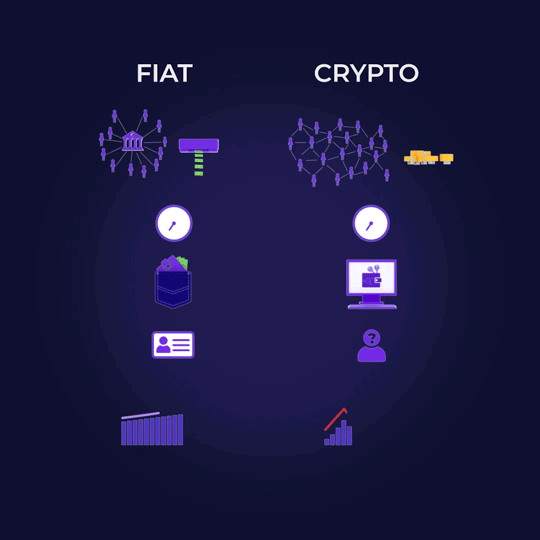Differences between fiat and cryptocurrencies
Understanding the difference between fiat and cryptocurrencies is very important, as this is the only way to get the best possible picture of what cryptocurrencies are and why they actually came about. Therefore, in this chapter, we will summarize the most important differences between them through different categories.
Regulation:
- Fiat currencies are regulated and issued by a central authority, such as for example, a central bank.
- Cryptocurrencies are usually not regulated, but when they are, the regulations are much looser than with fiat currencies.
Decentralization:
- There is no decentralization with fiat currencies, as they are under the control of a central authority.
- Cryptocurrencies are decentralized and aren’t controlled by any central authority. They are controlled by a network of computers.
Transparency and anonymity:
- Transactions with fiat currencies can be tracked by banks and financial institutions. Transactions are never anonymous, as each bank account is always linked to an identified user.
- Cryptocurrency transactions offer transparency through the use of blockchain technology, which allows for a public record of all transactions. The anonymity of cryptocurrency transactions, however, varies between cryptocurrencies. The customer’s identity is revealed only by the address of his wallet, which cannot always be attributed to a specific person.
Transactions:
- With fiat currencies, transactions are slower and more expensive, especially for international payments. They are also limited to the bank’s working hours.
- Cryptocurrencies can offer faster and cheaper transactions because they are not tied to a specific country or region.
Accessibility:
- Accessing traditional banks or financial institutions is a problem with fiat currencies. In today’s times, unfortunately, there are still people who do not have access to them, nor do the banks want to work with them.
- Cryptocurrencies can potentially increase accessibility to financial services, as location and other factors that could prevent an individual from opening a bank account do not play a role here.
Inflation:
- Fiat currencies are subject to inflation, as the control over the amount of printed money in circulation is in the hands of the central authorities.
- Cryptocurrencies are usually designed to have a fixed or limited supply, which reduces the risk of inflation because no one can decide to suddenly create new supplies of a cryptocurrency.
Volatility:
- Fiat currencies are more stable or less volatile than cryptocurrencies.
- Cryptocurrencies can be very volatile. This means that the market value of any cryptocurrency can be subject to sudden and significant fluctuations.

